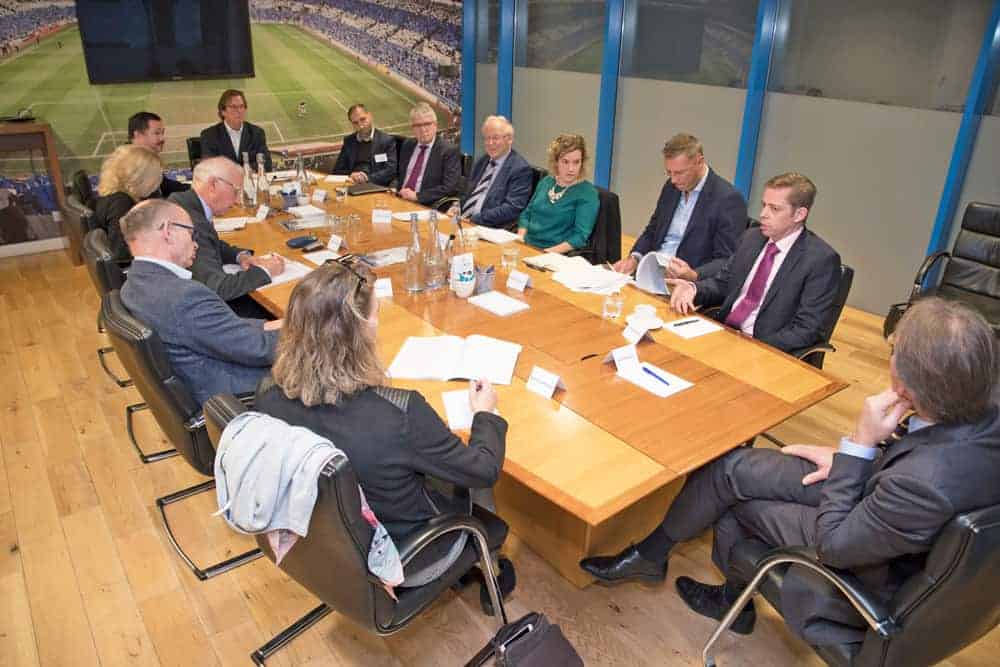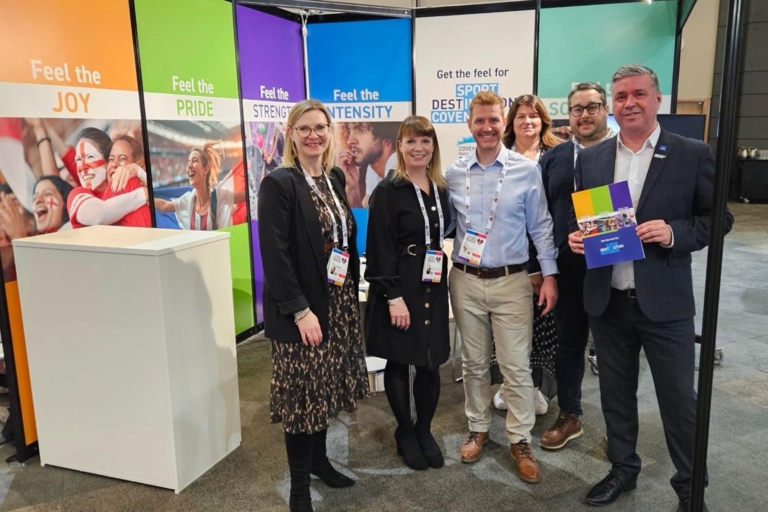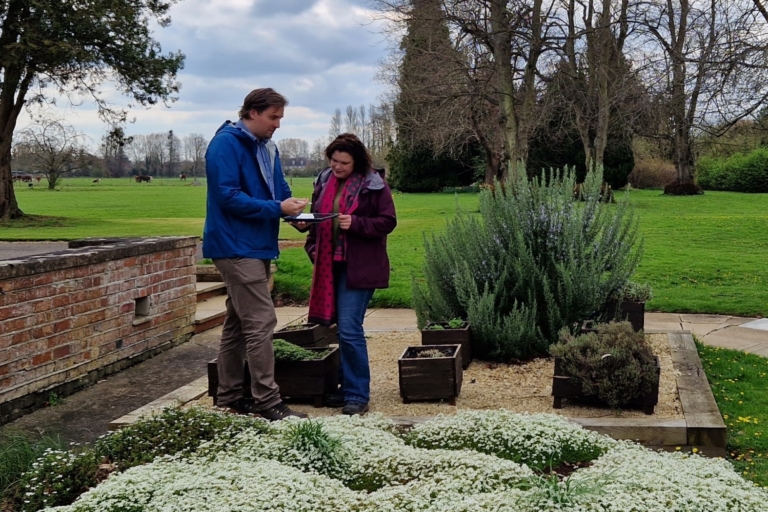Brexit business bugbears laid bare

The Business Magazine staged this roundtable with Southern Manufacturing 100 sponsors MHA MacIntyre Hudson, Lloyds Bank, Taylor Made Computer Solutions, and global insurance broker JLT along with invited business representatives. John Burbedge reports on the discussion.
Fears of a ‘car-crash’ Brexit scenario resulting in international trading issues including red-tape complexity, skill shortages, inadequate infrastructure and supply chain delays were some of the worrying topics discussed.
By a handshow, the majority of roundtablers viewed Brexit as negatively influencing their ongoing importing and exporting activities.
Unsurprisingly perhaps, this roundtable covered several rather downbeat potential outcomes from a protracted ’deal or no deal’ Brexit end-game. It took place on November 28, the day when government long-term economic analysis revealed that any form of Brexit – both deal or no-deal – will make the UK economy worse off long-term compared with staying in the EU.
Official figures say the UK economy could be up to 3.9% smaller after 15 years under Theresa May’s Brexit plan, and a no-deal Brexit could deliver a 9.3% decrease.
However, there was Brexit positivity too during the discussion, held at Madejski Stadium’s boardroom in Reading.
Uncertainty exposes weakest links in supply chains
Continuity of supply of EU-produced components for his FliteTrak transportation monitoring products was Andrew Barnett’s chief concern. “We don’t really want to second source any components currently coming from Europe. If we have to, our relationship with a major European client could be scuppered. To head that off we are opening an office in Europe.”
Belinda Whiteley: “Other businesses are doing that too.”
“Strangely, several European business discussions have also been put on hold, because people don’t know where we will be,” added Barnett. “I thought our B2B relationships would be strong enough to overcome that – plainly they are not.
“Some of those discussions have project delivery deadlines, so if things don’t get moving we’ll have projects coming off the table.”
Whiteley: “It’s hard to put a price on a contract if you don’t know what your cost of delivery is going to be.”
Jon Hawkins: “I can understand why logistics is a potential problem, but communication with European businesses doesn’t have to stop. Where’s the barrier?”
‘Us & Them’ mindsets, Barnett inferred: “Pragmatically, I would hope we are above that, but I’m really struggling to talk and progress things within the EU.”
Hawkins suggested both sides might be guilty of ‘cutting off one’s nose to spite one’s face’.
Bob Atkinson pointed out that Brexit was a risk for both the EU and UK. De-risking through delayed decision-making, stockpiling or alternative supply contingency planning were common sense measures.
Holding stock would not be an option for suppliers utilising Just-in-Time and Lean business models, noted Matthew Caffrey and Sue Flanagan.
“They need to meet delivery contracts or face penalties,” added Richard Perriman. “Speed and continuity of delivery will still matter post-Brexit.”
Richard Devall: “It’s just uncertainty driving all this, isn’t it?” A suitable Brexit transition period would avoid any trading ‘cliff-edge’ and help resolve such issues, he felt.
Can the customs systems cope?
“I don’t want to be an undertaker of doom but Brexit has the potential of being a car crash in terms of maintaining frictionless trade with the EU,” stated supply chain specialist Perriman.
“The Government is focused on appeasing UK businesses with new free trade deals but my clients are concerned with the potential complexities involved.”
Perriman highlighted the proposed CDS customs system planned to be introduced in January 2019. “Requisitioned in 2003, it is still very much in the ‘testing phase’. Anyone who thinks we can simply come up with a new scanning system is living in a dream world. We are decades away; it’s not a simple switch of systems.”
The existing system, in place since 1989, can handle 50 million rest-of-world entries per year. Post-Brexit, plus EU entries, that would rise to 210m. CDS was being designed for 100m entries, explained Perriman.
“At a granular level what has been missing is the reality of what is required in the process for clearing imported and exported goods.”
Tom Jeffery agreed. His company transports bespoke AV equipment for events throughout Europe. “No truckload is the same, so we’ll have to do customs carnets for each of them. We have US clients already suggesting that post-Brexit they may have to look for an EU supplier.”
Currency and complexity concerns
Kate Arnott: “We are seeing more manufacturing businesses hedge currency on contracts. That might smooth out currency fluctuations, but it won’t solve logistics issues.”
“Currency fluctuations were now a risky process in the volatile Brexit era”, noted Atkinson. “Hedging options are possibly vehicles to help smooth the way on larger projects”, but Flanagan felt this would be too complex for small manufacturing businesses to be able to exercise.
Stockpiling, cost-saving through production efficiencies, formation of subsidiaries or renting of space in the EU were also current business activities, said Arnott. “Worryingly for UK manufacturers, more French and German companies are also setting up over here. Supply chains can be two-way, after all.”
“Oddly enough it evens things up,” remarked Atkinson. “By holding their stock in UK, it brings us extra jobs and so on.”
Arnott: “The stumbling block is going to be the customs complexity, whatever systems come in. Customs duties, declarations etc, are already backlogged. VAT is going to become more complex too. You can obtain AEO (authorised economic operator) status to simplify things, but it takes a crazy-long time to get.”
Perriman: “If everyone has a AEO ‘speedy boarding pass’, no-one has an advantage. Other customs processes, such as CFSP, will put more of the onus and form-filling on the importer-exporter.
“Whether we get a Brexit agreement or not, the complexity remains. Will goods flow smoothly as they do in the EU now – absolutely not.”
Concerned about “the rigmarole” of meeting free trade deal criteria, Perriman added:
“If our international trading goes to WTO (World Trade Organisation) rules our status will have to be replicated with other WTO trading nations; it won’t be the same as a Most Favoured Nation (MFN) status that we may have with the EU.
“The average trade deal takes about seven years to negotiate.”
Will UK standards be valid? Will ‘Made in Britain’ matter?
Roundtablers had mixed views about post-Brexit product standards, certification and regulatory frameworks.
Caffrey: “I think standards generally are likely to be an issue, because certain sectors, automotive etc, depend heavily upon them.”
Barnett’s aerospace business sector is regulated by EASA (European Aviation Safety Agency) and has a bi-lateral agreement with USA.
“Are any of my current certifications going to be recognised or is that another time-hurdle I will have to get over? Is the UK Civil Aviation Authority ready to step up and take over the certification of products; have they got enough staff to oversee what has been happening on a Europe-wide basis?”
“There’s a bit of scaremongering about such things,” remarked Hawkins. “European CE product marking is so ingrained in our industries that companies will not stop it, and the Notified Bodies will still exist.”
“Notified Bodies have to have a European office to be EU-recognised,” stated Howard Clarke.
Atkinson: “Don’t people buy ‘Made in Britain’, because we uphold our own standards above and beyond what’s necessary?”
“Not always,” replied Whiteley. “We have opened a base in the States because they like to buy American and in dollars.”
Clarke: “Most of our products are shipped without a mains lead, or a UK label, and then finished as a US product.”
The Middle East still likes ‘Made in Britain’ badged products, noted Devall.
Arnott: “There is still value in ‘Made in Britain’ quality, but it depends on your sector or market.”
Any staffing difficulties?
With around 20% of SMEs having European employees, Peter Laurie queried if Brexit is producing staffing issues.
Flanagan said Oxford Plastics has kept its employees up-to-date with government announcements and their rights of residency. “We reassured them that we value them and want them to stay. Some Polish employees left early on, but there hasn’t been a major shift and we’ve actually had other EU people join us.”
Other roundtable employers had also not had any significant staffing issues
Arnott: “Reassuring and communicating with staff is exactly the right thing to do. We saw an initial unease, but in recent months HR consultants have helped ease and resolve concerns.”
Devall had been holding staff briefing workshops for clients. “Eighteen months ago there was a lot of concern, but much of the anxiety has now gone away – the UK-EU position is now much clearer to everyone. The problem may occur a few years from now if there’s a visa requirement for wider families to come to the UK.
“Recruitment generally is difficult at present, and Brexit will compound this issue.”
Skill shortages: Don’t they start at home?
Mention of the UK’s impending immigration controls quickly strayed into discussion about existing sector skills shortages.
Arnott revealed that lack of available and suitable skilled talent – not Brexit concerns – had again topped her firm’s annual MHA Manufacturing and Engineering Survey.
Devall: “Perhaps, our links made us lazy in using the EU talent pool, and it’s something we will have to address, as a positive, in the future.”
Whiteley felt foreign students too often gained a high-quality UK education then took their knowledge back home. “We should be aiming to retain such talent.”
Atkinson queried male-female perceptions of engineering, the academic structure and curricula. “Are our universities now too academic and not teaching enough practical skills?”
Do students got enough support in selecting their educational courses and understanding the proposed curriculum, queried Whiteley.
Hawkins felt academia’s commercial focus on student fees had distracted some educational bodies from creating appropriate business-related curricula, work-ready graduates and high standards.
Caffrey noted that Apprenticeship Schemes are meant to be employer-led, with skills gaps identified and filled through appropriate recruitment and education. Despite its costs, the Apprenticeship Scheme had actually focused many companies on better in-house training, he felt.
Academia and business: Let’s work closer together
With some companies having 40% of engineers over 50, there could be huge skills gaps coming when they retire. “So what are we doing about that?” queried Cranfield University’s Caffrey highlighting the need to work closer together. Universities play important roles in the education and business recruitment supply chains, and they do look for positive relationships with the business world, he added.
Having spent “several years wasting my time trawling for recruits” in the academia-supplied UK talent pool, Hawkins revealed he now goes direct. “I’ve made strong links with Bath University which has an excellent engineering projects programme that makes their students very employable.”
Barnett has also forged education links and helped with curriculum advice, for similar reasons. “I want to enthuse students, creative people coming through, that there is life in manufacturing and engineering.”
“There is an onus on SMEs to make links with good forward-looking universities and to go get the students. Don’t expect them to come to you,” said Hawkins. Equally, companies should respect their engineers’ skills and not let them “get stuck in ivory towers dealing only with tech problems”, rather than customers’ issues.
Atkinson suggested shorter academic knowledge courses linked to relevant and practical in-house training with businesses to achieve graduate degrees, rather similar to the four-year ‘thick sandwich’ courses previously offered by Brunel University.
BAe Systems is already doing something similar in Preston and Barrow, Caffrey mentioned. “We don’t see education stopping at the university stage. The whole idea is that it is applied and goes out to help business.”
The very real barriers of a post-Brexit world
Clarke: “Before we joined the EU, trading and going through customs barriers with carnet forms, regulations, inspections and all that palaver was an absolute nightmare.
Every country had different standards, and approvals were required in every one.
“Because trading has been almost frictionless people don’t realise how big the logistical problems can be. Anything that makes things different is actually a backward step and will be a big cost to business.”
Pre-EU membership, a UK truck had to be checked through five borders to get to Italy, Perriman exampled. The UK had 80 customs clearance companies at Dover; now there are four and no customs infrastructure. Europe currently provides 40% of UK food, that will require extra border inspection. “And that’s just one product sector. Are we prepared for all this? Absolutely not.”
Driver shortage is also a real post-Brexit threat with truckers already threatening to quit rather than face lengthy customs checks. Hiring and insuring a holiday car abroad will bring similar difficulties, he suggested.
Hawkins felt such problems were often exaggerated. “You would almost think we are going to war with Europe. Before the EU, surely UK drivers drove on the continent?
Perriman: “Yes, but we have acclimatised over 40 years to something very different and to suddenly switch back when the infrastructure has been dismantled ... we can’t do it.”
Hawkins: “It’s not in either party’s interest to be so belligerent. It will be stupidity not to operate reciprocally.”
Whiteley: “But today, anywhere in the world, we can hire a car and drive it can’t we?”
Perriman: “Such arrangements are underpinned by EU deals. These will each have to be renegotiated for the UK. “There are 1,300 EU trade deals alone with the US.
“Brexit isn’t just a case of flicking a switch.”
International trade makes the world go round
Whiteley: “I think you’ll find that money and international contracts make the world go round. Everyone has products that people want, and I feel quietly confident the world will want to do business with the UK.
“I’m unhappy about being dropped in this completely unknown ridiculous Brexit mess, but I think we are a good enough country to pull though.”
Arnott: “In our sector survey only about 30% of businesses cited Brexit as a major barrier to growth, 75% said they will grow during next year. As a sector, manufacturing and engineering is still positive. We need to be prepared for things to become more difficult, but business life will not cease.”
Whiteley: “Worldwide, things are constantly changing anyway; we are simply seeing a chance to trade differently internationally.”
Barnett credited Brexit with sharpening his company’s competitive edge. “It has helped me focus on our USP, because that is our world differentiator. If I am one of many, I am in a dog-fight, but my USP, allied to ‘Made in UK’, will help me punch above my weight.”
However, without EU-supported programmes, he was concerned about gaining appropriate future funding.
Devall mentioned that funding is still currently available from existing EU funding schemes. He also mentioned supportive government Brexit technical notices, HMRC information packs, and a helpful British Chambers of Commerce checklist provided online.
Arnott and Clarke commended UKTi trading assistance. Flanagan added: “We went on trade mission trips to the US and Australia with them, and that was very useful, helping with banking, insurance and trading structure set-ups.”
Since US and Australian standards and regulations can alter state to state, securing local agents had greatly helped Oxford Plastics’ exporting, noted Whiteley.
Clarke was pleased. He cited the importing concerns of one of his early American clients over the cost of ferry transport between the UK islands of Ireland, Scotland and Wales. “All their business was in the United States; an American’s view of the rest of the world can be very strange.”
Participants
Kate Arnott: Partner, MHA MacIntyre Hudson
Bob Atkinson: MD, InCloud Solutions
Andrew Barnett: Founder and managing director, FliteTrak
Matthew Caffrey: Head of manufacturing apprenticeships, The Manufacturing Co-operative
Howard Clarke: Research director, Morgan Innovation & Technology
Richard Devall: Partner, IBB Law
Sue Flanagan: Finance manager, Oxford Plastics
Jon Hawkins: Technical director, Newbury Innovation
Richard Perriman: UK supply chain development manager, Horizon International Cargo
Tom Jeffery: MD, audio visual specialist SFL Live
Belinda Whiteley: Director, Oxford Plastics
Peter Laurie: Head of client relations for The Business Magazine, chaired the discussion












